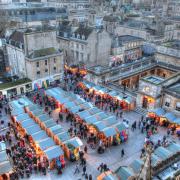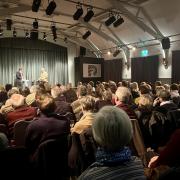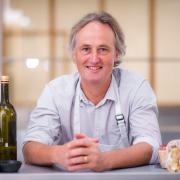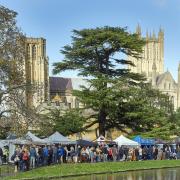Clare Kingsbury-Bell visits the creators of the world’s finest wool and cashmere cloth, Fox Brothers, in Wellington, to interview managing director Douglas Cordeaux.

British heritage emanates from every corner of Fox Brothers Mill. The smell of cloth and leather in the Victorian buildings, the broad oak tables supporting the weight of tomes of swatches dating from the 1700s and the picture of Churchill wearing a suit made of Fox cloth hanging from the wall, all tell their own story.
History is valued at this landmark Somerset business as much as quality.
The roots of the people who work the looms in the West’s last remaining cloth mill are important and those at the top are fighting to re-establish the skills of ancestors half lost in the consumerism of the modern age, and bring back a craft not reliant on fourth generation technology but fourth generation creativity and heart.
Fox has always led the way, being the official creator of flannel and khaki and is now leading the way for the West to become a new industry centre for British wool, highlighting the journey from sheep’s back to man’s back and protecting home-grown products as much as home-grown talent.
Managing Director Douglas Cordeaux equally has a rich history weaved and shaped by the people he has encountered and the conversations that have inspired him. Like the mill, his story begins in Somerset and remains here in his home county.
Born in Bridgwater, Douglas attended Haygrove School, before moving to Somerset College of Art and Technology and then went on to the Chelsea School of Art.
London had been his main home, but Douglas had always kept his strong links with Somerset and the opportunity of buying Fox Mill gave him the reason he needed to move back with his wife, Emma, and young family to give his children – Monty aged seven and 10-year-old Bunny - the country childhood he had enjoyed.
Do you live locally?
Yes, the children are at Queen’s School in Taunton and London is more of a holiday destination these days. We appreciate Somerset a lot having come from London and make the most of being able to go mackerel fishing or mountain biking whenever we like.
Were your Somerset schools an influence?
My family and I are all heavily dyslexic, so when I grew up it was like being thick, but today I have heard it described as ‘a gift’ because you are often more creative as a result.
I was really lucky to have a fantastic art teacher called Richard Gardener. All my friends had academic routes laid out in front of them, but I knew I didn’t want that.
Richard said this art college in Chelsea had my name all over it, but then instilled this fear that I needed an O-level in English to get in. However, I had a goal and getting into art college turned out to be a huge, life-changing moment for me.
How did your career progress?
It began printing T-shirts on my mum’s kitchen table and selling them in Bridgwater. Then, while at college, I took a job at a screen printers before working for myself selling textile designs across the world.
In my late 20s a Bridgwater friend of mine, who worked for Pepe Jeans, asked me to do some in house work for them. I met the owner of the company, Nitin Shah, who was the next hugely influential person in my life. He taught me about business and how to make something creative have commercial value.
Nitin had incredible vision and drive. Then as Cordeaux Design studios, I bumped into Carlos Ortega, who I started with at Pepe Jeans. He ended up owning the whole company. He said he really loved the work we were doing so our design studio went in house again to do a massive consultancy on denim and textiles.
He grew Pepe in Spain to astronomical levels. Again, he taught me so much about the commercial road for creative.
Why did you leave Pepe Jeans?
I reached a point when I realised my customer base was still aged 16-28 and I wasn’t.
By this time, Pepe had acquired Hackett. I had lunch with Jeremy Hackett and we were talking about British heritage brands, ones that were there, but not at the forefront of the market. I had just completed a project with Pepe producing a range produced entirely in the UK and that was very influential on my decision to find a British brand that reflected where I was in my life. Jeremy asked if I’d thought about Fox Brothers, but said ‘whatever you do don’t buy the mill’.
Where does Deborah Meaden fit into things?
I have known Deborah Meaden for 25 years and we had always been talking about opportunities in the West Country because we both come from here and it was always in the back of my mind to move back. We started off thinking about licensing the mill and creating The Merchant Fox brand. Then, when we walked in, saw the place and heard the sound of the looms, we just looked at each other and realised this was something special. That was five years ago and we’re very, very proud of what we’ve achieved over that time.
I am the Managing Director and run the day to day business and, as a board member, Deborah is heavily involved with the business strategy. She is a wonderful set of shoulders to talk to.
Historically, many famous faces have been seen in suits made from Fox cloth including Winston Churchill, Cary Grant and the Duke of Windsor.
How is business today?
Clients include Savile Row and top fashion houses, but our biggest market is still Japan. We are also seeing an up-rise in menswear, with clients who research what they are buying in great detail. They recognise they are buying a heritage product and they want to know its story.
We can tell them everything including there’s a lady called Alison across the road who has spun the ends and she’s fourth generation. The business is also working to highlight the diminishing wool trade and as part of the HRH Prince of Wales Campaign for Wool we turfed 150m of Savile Row and put sheep on it. Everyone looks at Savile Row as very elitist, but it is expensive because products are handmade at every stage and we’re trying to highlight that link back to the farmers who are the guardians of our countryside.
What’s so important about being proud of British-made goods and being British?
We are very good at being understated and don’t often shout about things, but are at the same time committed to good quality products and that’s part of the British charm.
To the Japanese, they want a bit of the heritage, a bespoke Savile Row suit is the closest thing they can get to a listed building to take home with them. It is the lifestyle that we take for granted that they want to celebrate.
What does the future hold for you and the mill?
We are trying to push this area as a centre for wool. We are working with Cannington Agricultural College and have our eye on using more of the empty mill buildings around our site. We want more training going on, another shop outlet, perhaps a café stocking local products, somewhere for the public to access our historical archives. We are also looking at more research into how British wool can be used in all sorts of industries, perhaps for loft insulation or duvet fillings.
We want to bring the farming communities together and also get skill sets back into this area. We did struggle to recruit locally at one point and have looked to ourselves to solve that by creating our own in-house apprenticeships.
We always want to remain at the top of the market and niche, but there is room to grow and to create the West of England Wool Centre.



























